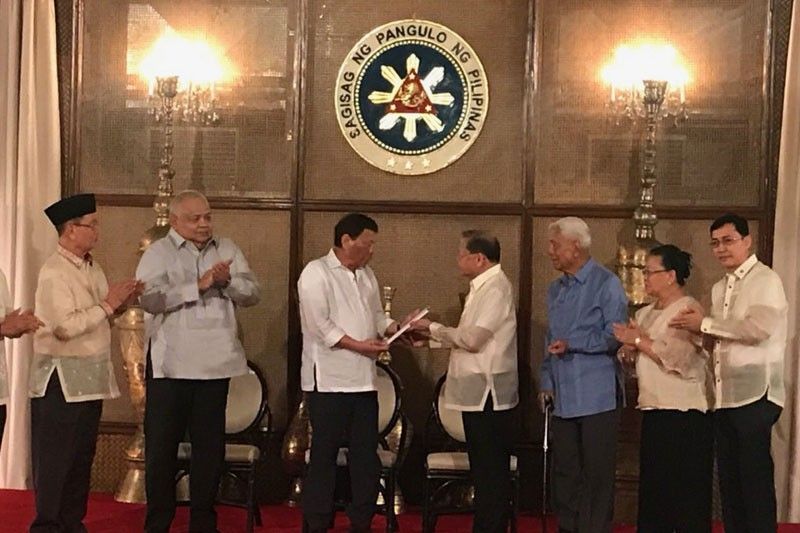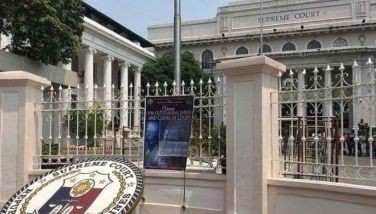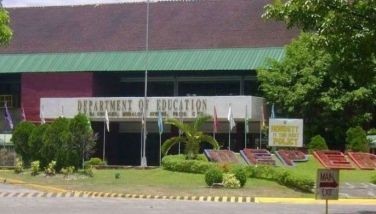Draft charter’s ‘protectionist’ provisions assailed

MANILA, Philippines — The Foundation for Economic Freedom (FEF) yesterday expressed serious concern about the economic provisions of the draft federal constitution, saying these are anti-investor and do not adapt to modern times.
In a statement, the association of economists, former government officials and members of the business community said the draft constitution retains all the restrictive and protectionist provisions of the 1987 Charter and past ones.
“These provisions have been responsible for the country’s historically inferior growth relative to the economic aspirations of the broader Filipino population and… to the country’s neighbors,” FEF said.
The draft constitution that seeks a shift to a federal form of government was crafted by the consultative committee created by President Duterte.
“These have sent strong signals to foreign investors that they are not welcome to invest in the Philippines to create jobs, transfer technology, provide healthy competition and improve the lives of Filipinos,” the group added.
FEF cited Article 2 Section 21 of the draft constitution stating the federal republic “shall develop an independent and competitive national economy actually and effectively controlled by Filipinos.”
The group also said Article 15 Section 3 retains the mandatory 60 percent Filipino ownership of companies while Section 4 requires 60 percent Filipino ownership of companies engaged in the exploitation of natural resources.
Section 12 strictly limits ownership and management of mass media companies to Filipino-owned firms. In the advertising industry, firms must be 70 percent Filipino-owned.
Section 13 retains the 60 percent mandatory Filipino ownership for firms engaged in the operation of public utilities. The same is stated in Section 15 for educational institutions.
Section 17 also stated the federal republic shall “regulate and exercise authority over foreign investments in accordance with its national goals and priorities and the general welfare of the people.”
FEF said the draft constitution also appears to be particularly restrictive with regard to the extractive industry.
“While we acknowledge that the draft constitution allows Congress to change the voting capital requirement and other requirements under certain conditions, the draft constitution does not fulfill the change that President Duterte promised,” FEF said.
FEF stressed the draft constitution signals that change will only happen if and when Congress sees fit.
“In the case of the exploration and development of natural resources, the draft is even more restrictive in casting in doubt the possibility of 100 percent ownership under a financial or technical assistance agreement (FTAA),” it added.
FEF also said such restrictions do not conform to the changing global landscape.
“We find these restrictions out of step and out of sync with reality. For example, the limitation on ownership of mass media entirely to Filipino citizens seems irrelevant in the age of the internet when Filipinos consume their mass media from foreign companies, such as Facebook, Netflix, CNN, Twitter and YouTube,” the organization said.
FEF also said such restrictions will discourage competition in the country and hinder the provision of better services.
“We also contend that provisions mandating preference to Filipinos in the ‘grant of rights, privileges and concessions covering the national economy and patrimony’ may be interpreted as keeping out foreigners to promote insularity, protectionism and worse, mediocrity and monopoly. The draft constitution does not project the Philippines as a modernizing country embracing the future but rather projects it as backward-looking, anti-modernist and protectionist,” it said.
FEF thus proposes that Congress be given greater power in regulating the entry of foreign investments as needed by the economy to allow the country to adapt to changing conditions.
“We propose that the default provisions not be restrictions but allow Congress to regulate the entry of foreign investments as conditions, including public welfare and national interest, warrant. Through this suggestion, we are following the practice of other countries which do not put such restrictions in their constitutions but legislate them, allowing for flexible responses to changing conditions,” FEF said.
“Moreover, by removing these restrictions in the fundamental law of the land, we are signaling that change has happened and we are open to investment, foreign or local,” FEF added.
The group said this is a good time to liberalize the economy to create more jobs as the country maintains a strong growth trajectory.
“Decisive economic liberalization to promote domestic and foreign investments and to create jobs is a pressing and paramount concern for the country at this juncture of its economic development. Thus, the restrictive and protectionist constitutional provisions which the draft proposes to perpetuate should be lifted immediately, even as the other impacts of the federal form of government are subjected to deeper and full study,” FEF said.
Not viable
The federal system of government as proposed by the Concom is not economically viable, Senate Majority Leader Juan Miguel Zubiri said.
Zubiri, an advocate of federalism, said the Concom’s proposal to create 18 federal states, including the Bangsamoro autonomous region, cannot be fiscally sustained due to insufficient government revenues.
“I’m a federalist among the members of the Senate but with all due respect to Concom, not the way it’s being presented now. I mean, 18 federal states? Come on guys, immediately after we implement that, only five states will be surviving in terms of economic viability. The 13 states will fold up. They have no money,” Zubiri told “The Chiefs” aired on Cignal TV’s One News.
Under the federal system as proposed by the Concom, federal states will generate and withhold much of the taxes collected in their territory even as the national government will put up an “equalization fund” to allow poor regions to catch up.
Presently, the total income collected by the national government is not enough to pay for half of the mandated internal revenue allotment (IRA) shares of regions, provinces, cities and municipalities, he said.
The IRA is 40 percent of the national taxes collected that is distributed to provinces, cities and municipalities using a proportional formula based on land area and population, among others.
Zubiri cited his province of Bukidnon needs P7.7 billion annually but its internally generated income is only P3 billion so the balance is funded by the IRA.
“So what about our teachers? Our social services, who will pay for them (if the IRA is scrapped)?” he said.
He described the proposal to divide the country into 18 federal states as a wrong move.
Zubiri suggested that only three regions – Luzon, Visayas and Mindanao – be made federal states so that greater income can be pooled and therefore shared.
The Senate committee on constitutional amendments is currently reviewing various Charter change proposals, including the one submitted by the Concom.
Federalism campaign
Presidential spokesman Harry Roque said anyone is welcome to help spread awareness about federalism as the Concom announced that it may tap presidential communications Assistant Secretary Mocha Uson for its information campaign.
“Of course, we seek to come up with standardized dissemination materials so that no one will deviate from the messaging,” Roque said.
“We’re developing materials for disseminators, and we are formulating a module to train first the trainors. And we’re developing a module for dissemination so that anyone who will follow the module can disseminate properly,” he added.
Malacañang has created an inter-agency task force that would conduct an information campaign on federalism.
“They (Concom) have a (communications) plan, but we (task force) have a broader com plan. The lead agency here, because of the limited life of the (Concom) which expires this Aug. 6, if I’m not mistaken, the initiative is now being led by DILG (Department of the Interior and Local Government) and PCOO (Presidential Communications Operations Office) and my office,” Roque said.
Despite the President’s backing, support for federalism remains low, according to a recent survey.
A Pulse Asia poll conducted last June found 67 percent of respondents saying they are against amending the 1987 Constitution, while 62 percent are not in favor of the proposed shift to a federal system of government. – With Paolo Romero, Alexis Romero, Jessica Sayson de Jesus
- Latest
- Trending





























